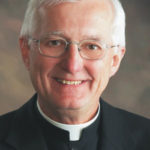Sept. 29 marks the first day for absentee ballots to be accepted in the county auditor’s office for the Nov. 8 general election. Even if we choose to wait until Election Day to cast our ballots, are we ready to make an informed decision on who will lead our nation?
Some people grumble that they aren’t going to cast a vote for president because they don’t support the major party candidates — Democrat Hillary Clinton and Republican Donald Trump. Nor do some voters support the major third-party candidates, Green presidential nominee Jill Stein and Libertarian Gary Johnson.
But as Pope Francis pointed out in his encyclical “Evangelii Gaudium,” we cannot sit on the sidelines in the fight for justice. That’s what is at stake in this and every presidential election. Opting out of voting for president simply means that a smaller portion of people will decide who represents all of us, who sets the agenda that impacts how justice is applied in our nation and around the world.
This year’s presidential campaign seems particularly challenging to Catholics trying to discern which presidential candidate best demonstrates the ability to serve the common good, which works hand in hand with justice. We have our marching orders. “The obligation to participate in political life is rooted in our baptismal commitment to follow Jesus Christ and to bear Christian witness in all we do,” the U.S. bishops say in their document, Forming Consciences for Faithful Citizenship. “As the Catechism of the Catholic Church reminds us, ‘It is necessary that all participate, each according to his position and role, in promoting the common good. This obligation is inherent in the dignity of the human person….”
We have plenty of resources to help us to identify the common good and to evaluate our presidential (and Congressional) candidates accordingly. The U.S. bishops’ Faithful Citizenship provides a broad understanding of Catholic teaching on issues impacting the common good (http://tinyurl.com/cxv9kr7).
The Iowa Catholic Conference’s Faithful Citizenship for Iowa Catholics (http://tinyurl.com/hlnmfkl) offers guidance about what to look for in our leaders, how to go about forming our consciences, and issues to address with candidates.
Forming our consciences is not as easy as scanning newspaper headlines or listening to sound bites on our favorite political talk shows or viewing social media feeds. We begin by studying Scripture and the teaching of the church. We examine the facts and background information about various choices, and we prayerfully reflect to discern the will of God. (Read about a simple novena for the local and national elections on the USCCB website at http://tinyurl.com/jfqu2uh.)
Citing the Compendium of the Social Doctrine of the Church, the ICC notes that our political leaders must be committed to “share fully in the destiny of the people and to seek solutions to social problems….” Responsible authority is about putting “power into practice as service (patience, modesty, moderation, charity, efforts to share).” These individuals seek the common good, and not prestige or personal gain.
The principles of Catholic social teaching must define our positions on issues and should invite reflection on the best specific response, as Bishop Martin Amos points out in his promotion of Faithful Citizenship for Iowa Catholics. These principles are dignity of the human person, subsidiarity and solidarity, freedom, participation, the common good and care for the poor and most vulnerable among us.
These principles are addressed in a series of questions that the ICC suggests we ask candidates seeking election in Iowa, but some of them are applicable to presidential candidates as well:
Do you support protecting human life from conception until natural death as a foundational principle?
Do you support maintaining Iowa’s ban on doctor-prescribed suicide?
Do you support assisting poor and vulnerable people by adequately funding programs that address hunger and joblessness and that help people rise above poverty?
Do you support legislation that helps immigrants provide for their families and become participating members in the community?
Do you support just wages and labor practices by employers?
Casting a vote for the next president of the United States requires far more of us as faithful citizens than simply marking a ballot. Study, prayer and reflection will make a difference.
Barb Arland-Fye, Editor
(arland-fye@davenportdiocese.org)











